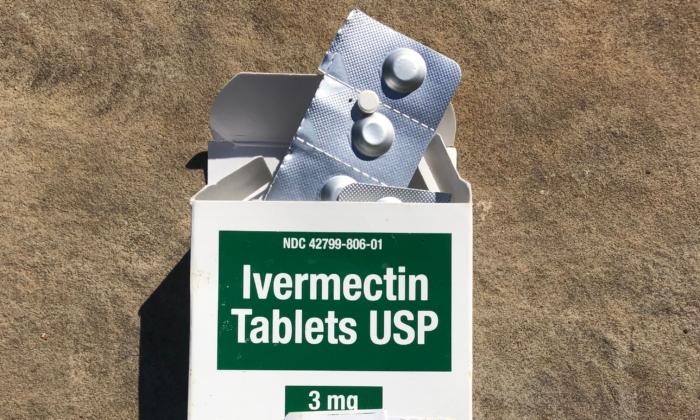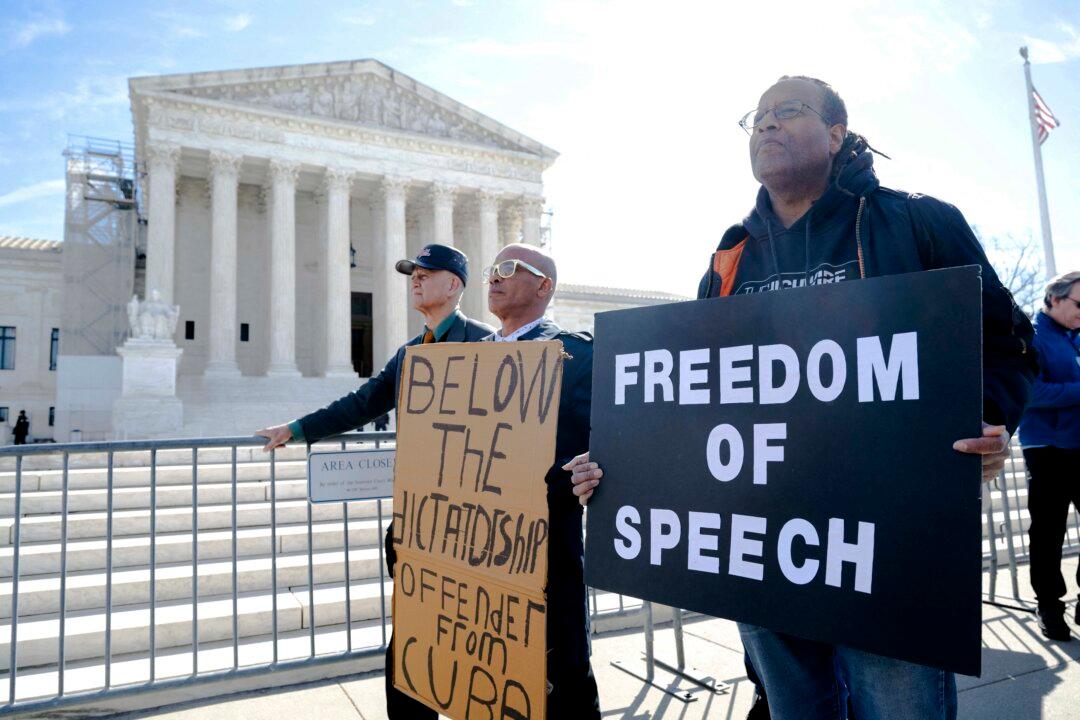Dr. Yusuf Saleeby has practiced medicine for more than 30 years. He serves patients in South Carolina and until recently had never faced an investigation from his state medical board.
But after Saleeby started prescribing ivermectin to his patients, he was reported to the board, which opened an investigation, despite the state’s attorney general’s promise that his office wouldn’t prosecute doctors who prescribed off-label medications.
The letter stated that the Food and Drug Administration only authorized ivermectin for use in humans when treating “parasitic worms and head lice and skin conditions like rosacea.”
“They did not say it’s prohibited or it’s unlawful. They also did not say that doctors may not prescribe ivermectin,” Isaac Belfer, one of the lawyers for the government, said during a Nov. 1, 2022, hearing in federal court in Texas.
The government’s arguments differ greatly from the reality many doctors faced for prescribing ivermectin. Some lost their jobs, others were investigated by state medical boards, and many received threats from the New York attorney general because they were prescribing across state lines.
When asked about the FDA’s new claim, Dark stated: “They knew it was safe for humans, and they made that very accusatory thing if you were a doctor prescribing this, you were an idiot. You were practicing like a hillbilly. So that message was loud and clear.”
“Pharmacies were responding to the practice and providers trying to write [ivermectin] the same way the FDA was behaving,” Dark said.
Wright concurred, and pointing to her letter from the New York attorney general, said, “It clearly states in this letter that according to the FDA, you must cease and desist in prescribing ivermectin to New York State residents.”

At the height of the pandemic, Sirotek said patients would reach out to her advocacy network and beg for ivermectin, either for themselves or their loved ones dying in the hospital.
She stated that in five separate instances, doctors were fired or forced to resign for prescribing ivermectin as a home medication for nurses to administer in hospitals.
“That happened five times, and each physician was fired. That’s five physicians in five different states and five different hospital systems.”
Julie McCabe, a registered nurse and director of advocacy services for American Frontline Nurses, told The Epoch Times that the above doctors include Dr. Edith Behr in Pennsylvania, Dr. John Witcher in Mississippi, Dr. Mary Bowden in Texas, Dr. Robert Karas in Arkansas, and Dr. Paul Marik in Virginia. Bowden and Marik are two of the three doctors suing the FDA over its stance on ivermectin.
Bowden told The Epoch Times that Houston Methodist Hospital suspended her for merely writing on Twitter about ivermectin, and she had to overcome “numerous obstacles” when prescribing it to patients.
“The FDA was the key creator of these hurdles when it launched a social media campaign stating that ivermectin is dangerous and only for horses. When faced with a lawsuit, the FDA now claims it was merely making suggestions—suggestions that have threatened my ability to practice medicine and more importantly, interfered with life-saving early treatment of COVID patients,” Bowden said.
With tears streaming from her eyes, Sirotek said she'd also received death threats, pictures of her house, and threats to murder her children. Sirotek provided copies of these threats to The Epoch Times. Team Halo didn’t respond to a request by The Epoch Times for comment.

Pushback Begins
In the spring of 2020, with COVID-19 spreading like wildfire through the population, finding a viable treatment was paramount in many doctors’ minds. And as no drug was approved to treat the novel virus, they turned to off-label use, a standard medical practice even in non-pandemic times.Almost immediately, ivermectin was put forward as a possible treatment. First approved for human use in 1987 and dispensed billions of times since then, ivermectin is traditionally prescribed to treat parasites. But it’s safe and was already known to have an effect on viruses.
“This is a medication that is safer than Tylenol, safer than stuff we sell over the counter,” Wright said.
Saleeby agreed.
“[Ivermectin is] probably one of the most prescribed drugs. It’s given out like candy in Sub-Saharan Africa and Amazon basin or anywhere around water. ... It’s doled out to children and pregnant women. ... As far as safety, it’s probably safer than baby aspirin. It’s probably the safest drug on the planet, to be honest.
“I was using [ivermectin] sporadically in some of my Lyme patients. It’s effective against Lyme. We knew it had effectivity against viruses and other pathogens like Borrelia and Babesia.”

Sirotek told The Epoch Times that, especially as the Delta strain increased hospitalizations and deaths in the United States, she and several nurses questioned why some countries seemingly remained unaffected. The answer, she believes, was widespread ivermectin use.
At first, prescribing ivermectin and obtaining it from a regular pharmacy wasn’t an issue, Wright said. More importantly, it worked.
“We started using it very early on, and I could prescribe it to the pharmacy. I would prescribe it according to the FLCCC recommendations because they were the ones doing the research. I was just validating that, you know, this has some real stuff behind it.”
When the pandemic began, ivermectin as an effective treatment was primarily a theory. But as health care workers reported that it worked, more and more studies were conducted to back up those early successes.
Simply put, as health care workers saw firsthand that ivermectin worked in their practices, studies were simultaneously confirming the medicine’s effectiveness.
“It seemed like it was within three to four days, like they [started feeling] better,” Raisanen told The Epoch Times.
Raisanen said he treated about 200 patients with ivermectin, and none died. Almost all stayed out of the hospital. That’s an experience several doctors attested to witnessing.
“We’ve probably collectively [at Roots Medical], treated 1,000 people with early COVID,” Dark said.
He said that when a patient was treated early on in their illness, there was a clear improvement—often within hours.
“It’s within two hours of that first dose that people start feeling noticeably better. And within two days, most symptoms are gone. Again, this is with starting early treatment, say days one to three, one to four, of infection or symptoms,” Dark said.
Saleeby didn’t specify the exact number of patients treated.
“I’ve seen some miraculous things in the patients that I prescribed ivermectin to, who follow our instructions, and get on it right away at the appropriate dose and do the nutraceutical bundles,” he noted. “[They] are not going into the hospital and they’re not dying.”
Pharmacies Impede Treatment
While ivermectin was obtainable from traditional pharmacies at the start of the pandemic, health care providers soon started to get pushback.“As I started prescribing [ivermectin] to more and more people, I started getting calls from pharmacists,” Wright said.
Julian said that when her patient tried to have his prescription filled, the pharmacists asked him if it was for parasites. When the patient said it was for COVID-19, the pharmacists “hassled him right there in the store,” she told The Epoch Times.
“Pharmacists are not supposed to ask people, ‘Why are you taking this medication?’ It’s not their business unless you make it their business,” Julian said.
Shortly after, the pharmacies started calling Julian and stating they wouldn’t fill her prescriptions for patients.

Dark, whose Colorado Healthcare Providers for Freedom network includes 275 doctors in Colorado, added that the pushback from pharmacies on ivermectin fulfillment was without precedent.
“There has never been a drug, like ivermectin, so singular at being picked out and said that ‘we will not fill under any circumstances.’ That has never happened before,” Dark said.
The refusals to fulfill prescriptions soon turned to threats.
“I had pharmacists tell me that they’re recording me for misinformation. For doing harm to my patients,” Wright said.
Answering the ‘Why’
The FDA’s website states that if a viable treatment exists for an illness during a health emergency, neither medications nor vaccines may be approved using an emergency use authorization.While there isn’t concrete proof for their position, some doctors and nurses interviewed by The Epoch Times theorized that the FDA’s pushback against ivermectin was motivated by the need to secure an emergency use authorization for the COVID-19 vaccines.
“They had an agenda. And the agenda was to push this new form of vaccine, this mRNA vaccine, because it was going to make the industry billions of dollars. And in order for them to promote this because they didn’t have the time to do randomized control trials for efficacy and safety, they had to use Emergency Use Authorization [EAU],” Saleeby said.
“It completely destroys the vaccine position,“ Dark concurred. ”One thing that’s written very clearly is that you cannot have a known acceptable form of treatment out there available to the public and still be operating under emergency use.”
“If there was a possible treatment for COVID-19, the vaccine would not be able to obtain emergency authorization use,” Wright said. “If there’s any possible treatment, then the vaccines would have to go through rigorous testing.”
The Epoch Times sought comment from the FDA, Dr. Anthony Fauci, the state medical boards in Colorado and South Carolina, CVS, Walgreens, King Soopers, and the New York Attorney General’s office.
The Colorado Department of Regulatory Agencies stated, “Any complaint that may have been received by the Colorado Medical Board as part of an investigation is confidential and unavailable for public inspection pursuant.”
The other agencies and pharmacies didn’t reply by the time of publication.






